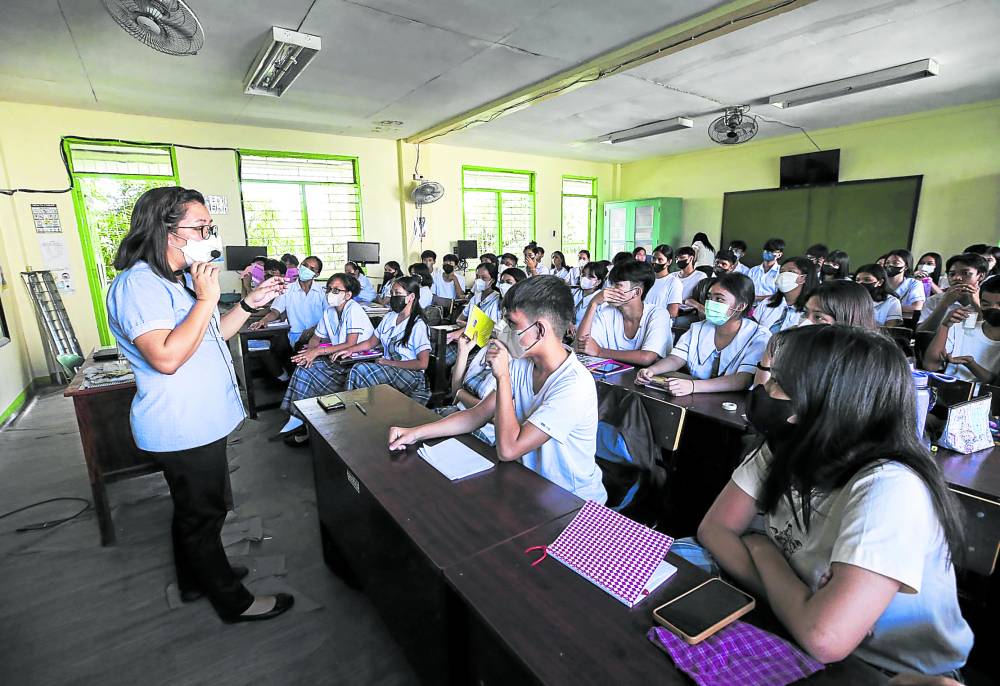Preparing teachers for revised K-10 curriculum

With the Department of Education (DepEd)’s plan to roll out a revised “Matatag” curriculum, nationwide teacher training is now underway. The training for kindergarten teachers and those teaching Grades 1, 4, and 7 will help them implement the revised curriculum this coming school year, to be followed by a staggered implementation for the rest of the K-10 grades over the next three years.
The revised curriculum will condense the competencies students are expected to learn, and prioritize foundational literacy and numeracy that are expected to build up core competencies among them. But the DepEd should also consider the issues raised by teachers, including how sufficiently equipped they are to implement the revised curriculum that should cater to the needs of students and classrooms, and the importance of minimizing their nonteaching tasks.
But how ready are the teachers? The Second Congressional Commission on Education’s (EdCom II) Year One Report has noted that teachers appreciate the decongested curriculum. However, they also pointed out some instances where competencies were repeated or had “abrupt changes [in] topics per quarter,” which raised concerns about how well students can master a given competency before moving on to the next.
These findings and the results of DepEd’s piloting of the curriculum in 35 schools over seven regions late last year are now being consolidated and addressed before the curriculum’s national rollout. DepEd is correct in putting significant time and attention on ensuring that teachers understand and can implement the curriculum. But how they receive this training is worth reflecting on as well.
Research from the World Bank (WB) has shown that teacher training programs in the Philippines are largely provided through standardized, trickle-down sessions from central and regional offices that often fail to account for the needs and experiences of individual schools and teachers. As a regionally diverse country with varying levels of comprehension, (dis)abilities, and backgrounds, the teachers’ familiarity and comfort with the new curriculum will likely require significant follow-up support in its future years of implementation.
Addressing language challenges. The language of instruction is one of the biggest changes to teaching next year. Following criticisms on the previous Mother Tongue-Based Multilingual Education program (MTB-MLE) that allows students to be taught in 19 languages in grades K-3, the revised curriculum expands this to 180 languages to build a wider foundational literacy. While this holds promise for students for them to gain foundational literacy in their mother tongue, it will also place greater demands on teachers. Previous challenges noted in MTB-MLE highlighted the lack of trained teachers to teach regional languages and a lack of learning materials in local languages. Building foundational skills is a central tenet of the revised curriculum, so addressing these challenges is vital.
Teaching materials and nonteaching responsibilities. In the Philippine Business for Education and EdCom II consultations with teachers on the main challenges they face, the most often mentioned are the limited availability of teaching and learning materials, and a host of nonteaching responsibilities that detract from their time spent teaching. A WB survey on teachers’ preferred additional support to enhance classroom teaching indicated that “more and better teaching materials” was mentioned by over 60 percent of respondents.
Additionally, EdCom II’s report noted regular delays in the distribution of textbooks, often forcing students and teachers to share textbooks or attempt to leverage additional learning resources. To address this, DepEd has recently released guidelines meant to streamline and shorten production and distribution timelines. But how well these guidelines are implemented bears watching. Teachers, too, are often saddled with nonteaching responsibilities that range from supporting the implementation of health programs to conducting safety drills. To ease this, DepEd has hired 18,000 school administrative officers since 2020, with another 10,000 added this year.
However, many schools have yet to receive these support positions. Those that have are reported to have job descriptions that cover only a portion of the nonteaching tasks that teachers currently undertake.
If teachers are to focus on teaching, time spent in the classroom must be prioritized. Curriculum reform efforts and prioritizing foundational learning are worthwhile goals to improve learning outcomes in the country. However, to reach these goals, it is essential to sufficiently equip teachers to implement the revised curriculum, cater to the needs of students and classrooms, and minimize nonteaching tasks.
Steven Walker is manager at IDinsight, with expertise in education, social inclusion, and human development.
















